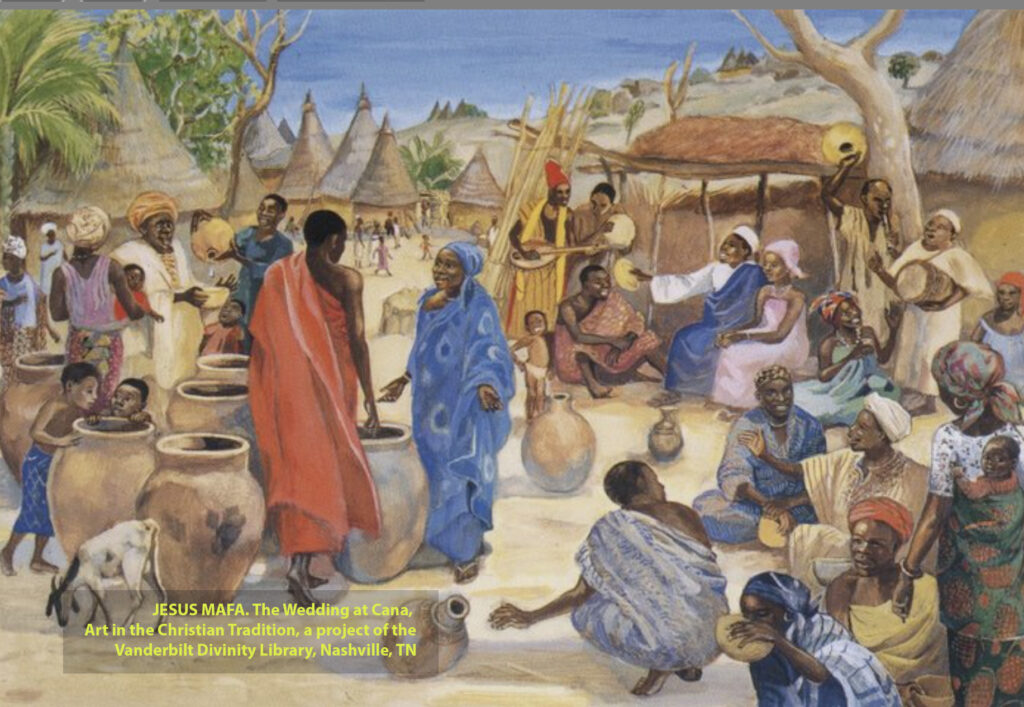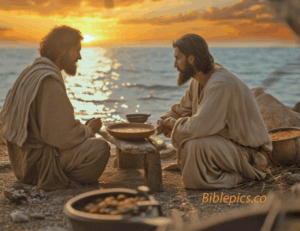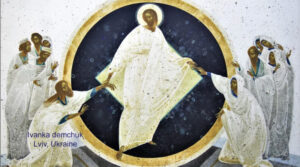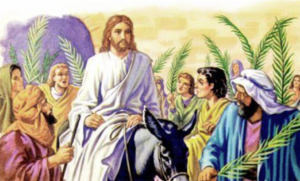THE WEDDING FEAST AT CANA
There was a wedding at Cana in Galilee,
and the mother of Jesus was there.
Jesus and his disciples were also invited to the wedding.
When the wine ran short,
the mother of Jesus said to him,
“They have no wine.”
And Jesus said to her,
“Woman, how does your concern affect me?
My hour has not yet come.”1
His mother said to the servers,
“Do whatever he tells you.”
Now there were six stone water jars there for Jewish ceremonial washings,2
each holding twenty to thirty gallons.
Jesus told them,
“Fill the jars with water.”
So they filled them to the brim.
Then he told them,
“Draw some out now and take it to the headwaiter.”3
So they took it.
And when the headwaiter tasted the water that had become wine,
without knowing where it came from
—although the servers who had drawn the water knew—,
the headwaiter called the bridegroom and said to him,
“Everyone serves good wine first,
and then when people have drunk freely, an inferior one;
but you have kept the good wine until now.”
Jesus did this as the beginning of his signs at Cana in Galilee
and so revealed his glory,
and his disciples began to believe in him.4 John 2:1-11
- “My hour has not yet come.” John’s Gospel is theologically organized, so this response of Jesus to his mother’s request may be indicating that Jesus knows where actions such as miraculously fulfilling the need for more wine or healing the sick will lead him – to notoriety, conflict with religious authorities and, possibly death. Life as he has known it up until this moment will end and his public ministry would begin.
- The “Jewish ceremonial washings” were for cleansing the skin from contamination. Jesus’ life, passion, death and resurrection will cleanse and restore the inner contamination of all of humanity.
- Note: The account appears to say that Jesus said and did nothing that could be heard or seen.
- “His disciples began to believe in him.” In seeing the water become wine, the disciples see something in him that they did not see until then. Will you and I see something in Jesus, and perhaps in ourselves and others in the places, activities, encounters and other experiences of this Liturgical Year? What can we do to optimize this occurring?
The wedding feast of Cana only appears in John’s Gospel and it is the first miracle mentioned in this Gospel. Coming immediately after the Prologue (“In the beginning was the Word, and the Word was with God.” John 1:1), the testimony about Jesus by John the Baptist and the accounts of Jesus’ calls for Andrew, Peter, Philip and Nathaniel to follow him. With the story of the miracle of the wedding feast of Cana, John signals the start of Jesus’ public ministry. This is a good place for us to start our current year of our own ministry in answer to Jesus’ call to us to proclaim to ourselves and everyone else that the Lord is in our midst and we are important players in the creation of God’s kingdom “on earth as it is in heaven.”
DISCIPLES – A TEAM OF PLAYERS, ALL WITH THE SAME MISSION BUT WITH DIFFERENT GIFTS
Then, in the Second Reading, we are asked to stop and ponder the privilege we each have to be in our various positions on the team of disciples which is led by the Spirit, “the Advocate, the holy Spirit that the Father will send in my name—he will teach you everything and remind you of all that [I] told you.” John 14:26:
Brothers and sisters:
There are different kinds of spiritual gifts but the same Spirit;
there are different forms of service but the same Lord;
there are different workings but the same God
who produces all of them in everyone. I Corinthians 12:4-6
In the First Reading and the Psalm Response we let the prophet Isaiah remind us of how treasured we are by our God, Father, Son and Holy Spirit and that God “rules the world with fairness.”
The LORD delights in you
and makes your land his spouse.
As a young man marries a virgin,
your Builder shall marry you;
and as a bridegroom rejoices in his bride
so shall your God rejoice in you. Isaiah 62:5
Declare among the nations: The LORD is king.
The world will surely stand fast, never to be shaken.
He rules the peoples with fairness. Psalm 96,10
Ponder: Do I believe this:
God so loved the world and every one of us that God becomes a human
- walked beside us humans, demonstrating God’s abiding love – asking us to continue this work that he began while physically here with us?
And God “rules the world with fairness.”
Am I striving to be as fair to God as God is to me?
HOW CAN I BE MORE ATTENTIVE AND FAIR TO GOD DURING THIS CURRENT LITURGICAL YEAR?
The wise, Holy Mother Church prayerfully and intelligently structured the Liturgical Readings to guide those who use them wisely and consistently to grow interiorly into the likeness of God to which they are being drawn. (That was God’s plan, and God designed us with internal tools [intellect, conscience] and mecanisms [feelings, emotions, sensations] to enable that, and with another tool [free will] to choose it. It is our call.) Doing so, using the Readings, the tools and the mechanisms wisely and consistently, we will learn day by day who Jesus and the Father are and come to let them make us more like them.
In doing so, we will be creating the Kingdom of God within ourselves and helping to establish God’s Kingdom in our families, neighborhoods and world.
Sister Loretta





